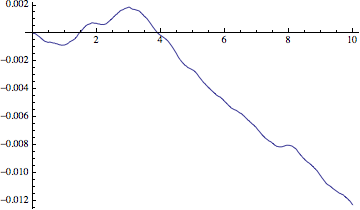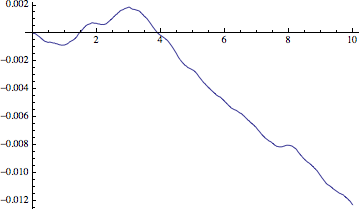You can have NDSolve do the integration but not save the results (set second argument to {}). Then use EvaluationMonitor to save points at whatever interval dt you please. This uses much less memory; in fact for dt = 10^-2, the memory use is negligible for the settings below.
Since parameters were not given by the OP, I used the simplest choices. Also, waiting for ten billion steps seemed silly for a proof-of-concept trial, so I lengthened the step size.
MaxMemoryUsed[] SeedRandom[1]; R[t_Real] := RandomVariate[NormalDistribution[0, 1]]; values = {k1 -> 1, k2 -> 1}; lastt = -1; dt = 10^-2; {foo, {pts}} = Reap@NDSolve[{(-x''[t] - k1*x'[t] + k2*R[t]) == 0, x[0] == 0, x'[0] == 0} /. values, {}, {t, 0, 10}, StartingStepSize -> 10^-5, Method -> {"FixedStep", Method -> "ExplicitEuler"}, MaxSteps -> ∞, EvaluationMonitor :> If[t >= lastt + dt, lastt = t; Sow[{t, x[t]}]] ]; sol = Interpolation[pts]; MaxMemoryUsed[] Plot[sol[t], {t, 0, 10}] (* 37243360 *) (* 37243360 *)

When the integral x is requested, the memory use by NDSolve is significantly higher:
MaxMemoryUsed[] SeedRandom[1]; R[t_Real] := RandomVariate[NormalDistribution[0, 1]]; values = {k1 -> 1, k2 -> 1}; lastt = -1; dt = 10^-2; {foo, {pts}} = Reap@NDSolve[{(-x''[t] - k1*x'[t] + k2*R[t]) == 0, x[0] == 0, x'[0] == 0} /. values, x, {t, 0, 10}, StartingStepSize -> 10^-5, Method -> {"FixedStep", Method -> "ExplicitEuler"}, MaxSteps -> ∞, EvaluationMonitor :> If[t >= lastt + dt, lastt = t; Sow[{t, x[t]}]] ]; sol = Interpolation[pts]; MaxMemoryUsed[] Plot[x[t] /. First[foo] // Evaluate, {t, 0, 10}] (* 37243360 *) (* 127874624 *)




valuesdo? Is there a reason you are usingExplicitEuler? You would benefit by letting Mathematica choose the solver automatically or use perhaps the magic-wandMethod->"LSODA". Also, why not just let t range from 0 to a very large number (for long term behavior)? $\endgroup$